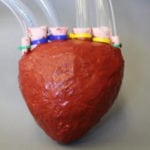 Movies and TV
Movies and TV  Movies and TV
Movies and TV  History
History 10 Dirty Government Secrets Revealed by Declassified Files
 Weird Stuff
Weird Stuff 10 Wacky Conspiracy Theories You Will Need to Sit Down For
 Movies and TV
Movies and TV 10 Weird Ways That TV Shows Were Censored
 Our World
Our World 10 Places with Geological Features That Shouldn’t Exist
 Crime
Crime 10 Dark Details of the “Bodies in the Barrels” Murders
 Animals
Animals The Animal Kingdom’s 10 Greatest Dance Moves
 Movies and TV
Movies and TV 10 Box Office Bombs That We Should Have Predicted in 2025
 History
History 10 Extreme Laws That Tried to Engineer Society
 History
History 10 “Modern” Problems with Surprising Historical Analogs
 Movies and TV
Movies and TV 10 Movie Adaptations That Ruined Everything for Some Fans
 History
History 10 Dirty Government Secrets Revealed by Declassified Files
 Weird Stuff
Weird Stuff 10 Wacky Conspiracy Theories You Will Need to Sit Down For
Who's Behind Listverse?

Jamie Frater
Head Editor
Jamie founded Listverse due to an insatiable desire to share fascinating, obscure, and bizarre facts. He has been a guest speaker on numerous national radio and television stations and is a five time published author.
More About Us Movies and TV
Movies and TV 10 Weird Ways That TV Shows Were Censored
 Our World
Our World 10 Places with Geological Features That Shouldn’t Exist
 Crime
Crime 10 Dark Details of the “Bodies in the Barrels” Murders
 Animals
Animals The Animal Kingdom’s 10 Greatest Dance Moves
 Movies and TV
Movies and TV 10 Box Office Bombs That We Should Have Predicted in 2025
 History
History 10 Extreme Laws That Tried to Engineer Society
 History
History 10 “Modern” Problems with Surprising Historical Analogs
10 Surprising Traits That Are Hereditary
Some traits are easily recognized as pieces of our DNA. Hair and eye colors, height, and the shape of our noses can typically be found in one or both of our parents. Ailments such as high blood pressure or mental illness have a hereditary factor, too.
Most traits commonly associated with our genetics are physical. We tend to believe that the way we behave and our personal preferences stem from our environment, lifestyle, and experiences. In reality, genetics play a large role in these factors as well.
Here are 10 surprising traits for which you can thank (or blame) your parents.
10 How Nice You Are

Your capacity for kindness and empathy is predetermined by your DNA. A certain gene produces a receptor for oxytocin, the “love hormone.” The receptor determines how much compassion you are inclined to show toward others.
The gene that produces the oxytocin receptor comes in three variants: G/G, A/G, or A/A. Those with the double G variant, one inherited from each parent, show the highest capacity for kindness. Those with the A/A variant show the lowest amounts of empathy for others, and A/G falls in the middle. Additionally, the G/G variant has been linked to a lower risk for autism and social anxiety, with the opposite being true for A/A.
A study revealed that people predisposed to be kind can maintain their niceness factor even during tough circumstances. Researchers examined how people acted when they felt fearful and related this to the variant found in their DNA.
The results showed that people with the G/G variant displayed the same amount of goodwill toward their peers even when they felt unsafe, while people with A/G or A/A variants who felt threatened responded by showing less compassion for others.
The good news is that kindness is common. In a study of 348 people, 51.5 percent had the double G variant, while only 7.2 percent had the A/A type.[1]
9 Your Interest In Traveling

Some people are satisfied to spend their lives in one place without venturing far from their hometown. Others make it a priority to travel the world. The difference can be found in variations of the dopamine receptor gene. A certain variation of this gene, DRD4-7R, has been associated with curiosity and restlessness and is often referred to as the “wanderlust gene.”
Studies of DRD4-7R have shown that people with this variant have an adventurous spirit and are more open to new experiences. About 20 percent of people in the world have this gene variant. The variant is more prevalent in countries that are farther away from Africa.
This finding relates to the assumption that all human life began in Africa. If the earliest humans originated in Africa, then human populations that are far away were started by ancient ancestors who traveled quite a distance to find their new home.[2]
DRD4-7R also has an association with “Neanderthalic behavior.” So carriers might spend their lives traveling and exploring exotic locales, but they also might end up thumping their chests and occasionally practicing cannibalism.
8 How Food Tastes

Some people have an affinity for spicy foods, while others prefer the blandness of plain white rice or the simplicity of a peanut butter and jelly sandwich. A meal that is delicious to one person could be gagworthy for another. The flavors you enjoy are determined by genetics.
An early discovery of the relationship between DNA and taste happened in 1931. Chemist Arthur Fox was working with powdered phenylthiocarbamide (PTC). When some of the powder puffed into the air, Fox’s colleague complained about the bitter taste. Fox had no idea what his colleague meant. To Fox, the PTC powder had no taste at all.
This led to an experiment among friends and family to see how the taste of PTC was perceived by others. The results varied between extremely bitter and completely tasteless. It was eventually discovered that the taste of PTC was related to TAS2R38, a gene that affects taste buds. The specific variation of TAS2R38 possessed by a person determines if PTC tastes bitter or like nothing at all. The different gene variants are referred to as “tasting” or “non-tasting.”
A 2005 study discovered that TAS2R38 variations also affect how much a kid loves candy. Children with two versions of the bitterness “tasting” gene were more likely to favor food and drinks with high sugar contents. As for people who do not particularly enjoy sweets, another genetic influence may be at play. Some people are categorized as “supertasters.”
Supertasters inherited more taste buds than the average person, which causes them to become overwhelmed by certain flavors. They avoid foods with strong flavors, including very sweet desserts, so it is not surprising that supertasters tend to be thin.[3]
7 Your Driving Skills

The next time you get pulled over, you could try telling the cop to blame your poor performance behind the wheel on your DNA. A study done by neuroscientists at the University of California–Irvine found that people with a certain genetic variant are worse drivers than those with the “normal” gene.
Brain-derived neurotrophic factor (BDNF) is a protein secreted in the brain during certain activities. BDNF keeps brain cells functioning optimally and supports memory and learning. People who have the gene variant produce less BDNF that those without the variant. This means that during certain tasks, people with the variant are less capable of learning new skills, retaining information, and correcting their actions based on mistakes.
In the study, researchers created a simulated driving test with a tricky route full of curves and turns. Participants were told to drive 15 laps. They were assessed on how well they navigated the track and whether their driving skills improved as they repeated laps. Out of 29 participants, seven of them had the gene variant. The drivers with the variant performed more than 20 percent worse than the drivers without it.
Around 30 percent of Americans have this gene variant. So if you are in the US and find yourself frustrated with three out of every 10 drivers you encounter, try to remember that their incompetence is not entirely their fault.[4]
6 How Popular You Are

If you have a lot of friends, you might have inherited the “popularity gene.” Geneticists have identified certain genes that make people behave in likable ways. Researchers examined which behaviors are determined by DNA and if those behaviors lead to positive responses from peers.
One study revealed that popularity in males has a strong association with the gene that affects serotonin levels. Higher levels of serotonin have been linked to impulsiveness, which leads to rule-breaking. And rule-breaking tends to make a young man well-liked among his peers.
More than 200 males were analyzed in a study that compared their genetics to how popular they were viewed in a group setting. Troublemakers were rated as more popular, and they usually carried the “popularity gene.” The gene is still being studied for links to other likable behaviors as well as its impact in females.[5]
5 Your Musical Talents

It takes more than years of practice to become an amazing piano player or a rock star bassist. It also requires the right genes.
A Swedish neuroscientist led a study that examined musical abilities in identical twins. Participants were evaluated on how well they could detect pitch and recognize rhythms, and they were asked how often they practiced an instrument. The results showed that the twins displayed equal levels of musical ability regardless of how different their practice habits were.
An extreme example was a set of twins where one man spent over 20,000 more hours practicing than his brother did, yet they each exhibited the same level of musical ability.[6]
Researchers also discovered that the tendency to practice an instrument was between 40 and 70 percent inherited. The conclusion was that genetics influenced both the capacity for musical talent as well as the likelihood a person would nurture that talent through rehearsal and repetition.
Scientists are quick to point out that children should never be discouraged from practicing an instrument because practice will increase anyone’s skill level. However, those who lack the right genes will find their talent ceiling much lower than those gifted with musical aptitude.
4 How Lazy You Are

Some people go to the gym every morning, while others view the trip from the couch to the fridge as a form of physical exertion. If the latter sounds like you, you probably inherited your laziness. Research suggests that our DNA determines how physically active we are. Scientists discovered areas of a mouse genome that influenced activity levels. Humans have genes that correspond to the genes identified in the mice.
By using the area of the mouse genome that influenced activity levels, mice were bred to be either physically active or physically inactive. A 2008 study that compared the mice with “active” genes to the mice with “inactive” genes had interesting results. All the mice were put in individual cages that contained an exercise wheel. The mice with active genes ran their tiny hearts out, while the mice with lazy genes found other uses for the wheel. One mouse used shavings to make a bed on the exercise wheel, while another used it as a toilet.
Another study that took place in 2013 did a similar experiment with rats. Not only did scientists observe the behavior of active and inactive rats, but they also bred the most active rodents with each other and paired the laziest to do the same.
After 10 generations, the rats with the active gene were 10 times more likely to use their exercise wheel for its intended purpose than the rats from the lazy family.[7]
While the studies on mice and rats are good indicators, replicating the results in human trials is the next step. A lab is likely already in the process of assembling person-sized cages and exercise wheels.
3 Your Coffee Addiction

Some people get by on a sip or two of morning java, while others would hook themselves to an IV of espresso if they could. The difference can be linked to genetics.
In 2016, scientists identified a gene, PDSS2, that influenced caffeine consumption. A study of populations in Italy and the Netherlands showed a correlation between PDSS2 and the amount of coffee a person drinks.
PDSS2 is found in everyone’s DNA, but some people have variants that are more active than others. People with a more active variation of this gene reported drinking less coffee.
Scientists believe this is because PDSS2 regulates the production of proteins that metabolize caffeine. Therefore, people with a more active version of PDSS2 feel the effects of caffeine slower and over a longer period of time, which causes them to consume less of the substance.
Those with a sluggish PDSS2 variant feel the effects of caffeine rapidly, but the effects also fade quickly. This leads people to drink more coffee and other caffeinated beverages to continue feeling alert and awake.[8]
2 How Bad Your Hangover Is

If you wake up after a bender feeling like an elephant stomped on your head a few times, it is not solely because of how much you had to drink the night before. Recent studies have shown that DNA influences the potency as well as the frequency of hangovers.
Some people have a mutation in the gene that affects how our body processes alcohol. This mutation causes people to begin metabolizing alcohol quickly. Unfortunately, people with this gene mutation often have a related mutation that drastically slows the process right after alcohol is converted into acetaldehyde, a toxic enzyme.[9]
Basically, this pair of gene mutations causes a person to feel the immediate effects of alcohol more quickly, and it also prolongs the most toxic step in metabolizing booze. This has the dual effect of making someone a cheap date as well as a miserable morning-after companion, all thanks to genetics.
1 For Whom You Vote

Your political views are not based solely on your personal values and morals.
Researchers have discovered that the tendency to follow convention is influenced by genetics. A study of identical and fraternal twins showed that identical twins were significantly more likely to share the same values than fraternal twins. The three main values looked at were authoritarianism, conservatism, and religion. These three values are viewed collectively as “traditionalism.”[10]
The level of importance you place on traditionalism tends to determine whom you vote for and which political parties you support. For example, the Democratic Party embraces nontraditional movements such as abortion rights and same-sex marriage. People who are genetically wired to follow convention would have a hard time accepting these nontraditional movements, even if they agreed with other parts of a Democratic platform.
Political scientists say that if predispositions to traditional or nontraditional values are genetically rooted, that makes rational debate and compromise on these subjects very difficult. This can certainly be seen in contemporary politics.
Read more amazing facts about human traits and how we get them on 10 Organ Recipients Who Took On The Traits Of Their Donors and Top 10 Remarkable Traits Neanderthals Have In Common With Modern Humans.








